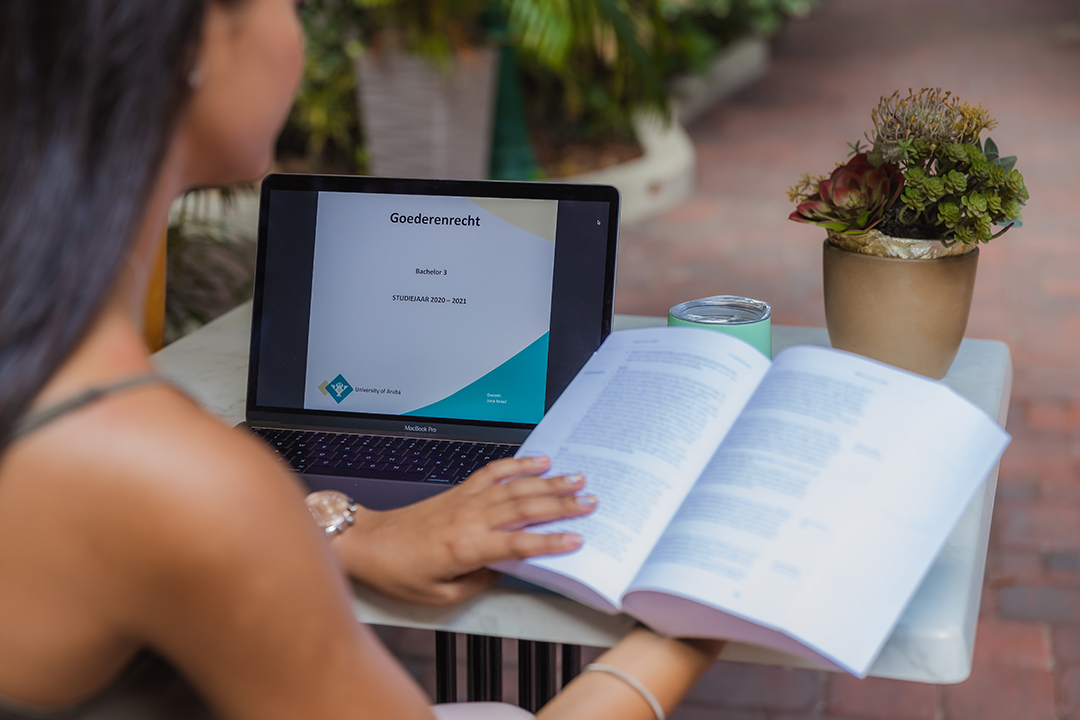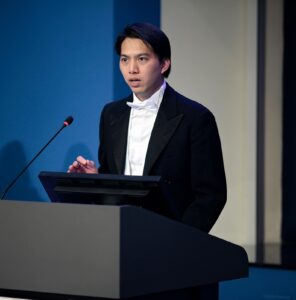About this study program
Do you care deeply about justice?
Would you like to understand the laws that govern today’s ever-changing social landscape?
Are you interested in helping people understand their rights and upholding the laws of the land?
If so, then the Bachelor’s Degree in Aruban Law is the study program for you!
Studying law offers the opportunity to develop a range of skills and explore many aspects of human life. With the Bachelor’s program in Aruban law, you will learn more than just the law. You will learn how to strengthen your skills to think critically and develop both abstract thinking and practical problem-solving. The Bachelor’s Degree in Aruban Law gives you the chance to sharpen your mind, strengthen your understanding and deepen your experience across the full range of humanities and social sciences.
You don’t have to become a lawyer just because you’ve done a law degree; many choose other paths. A law degree can give you the skills to be a successful attorney at law but also a successful civil servant, diplomat, legal advisor, politician, journalist, police officer, researcher, activist, and so on. You can also choose to complement your degree with a Master’s degree. A law degree equips you for almost any profession that requires intellectual strength combined with a practical approach to the world.
What can I expect from this study program?
The Bachelor’s degree in Aruban Law is taught in Dutch and is a three-year program designed to give you a solid foundation in Aruban Law. The program puts a strong emphasis on class discussions and group assignments. We believe that only through mutual discussion and cooperation can the desired understanding of the law arise.
We regard a new law student at the Faculty of Law (FdR) as an attorney from the very first day. A jurist at law is curious about new developments in his or her field and is capable of searching for relevant information independently.
The whole basis for the organization and design of our education is based on the didactic concept of Student-Centered Learning (S.C.L.), which relies on the principle that studying is something that the student actively does and pursues. This contains two core elements: 1. the student and 2. intrinsic active engagement with the study material by the student.
At the Faculty of Law it is thus not the transfer of knowledge by the teacher that is the central focus, but the active learning by the student in order to gain knowledge and insight. We aim to promote active student participation within the program, whereby the student increasingly learns to explore and learn independently during the study, with the ultimate goal that the student can independently conduct research at an academic level. This is reflected in both our teaching methods and our method of examination.
Our aim is for you to become more self-sufficient and independent as the study progresses. As a student at the Faculty of Law, you think like a jurist from day one!
Study Abroad
At the Faculty of Law, you can study close to home but also gain experience abroad during your study trajectory. In the third year of the Bachelor’s degree program, you can take elective courses at a foreign law faculty, do an internship or complete a research assignment through exchange programs such as the Erasmus+ mobility program.
The Faculty of Law collaborates with a number of foreign universities to organize exchange programs based on the Erasmus+ mobility program and other non-Erasmus exchange.
In the third year of the Bachelor’s degree program (full-time), you can take elective courses at a foreign law faculty, do an internship, complete a research assignment, or follow an exchange program in the Netherlands or Europe through the SEA+ Kingdom mobility program or Erasmus+ mobility program. Students following the part-time Bachelor’s degree program can follow an exchange program abroad in the fifth year.
Contact the Office of International Affairs for more information
Graduate possibilities
Career opportunities
A jurist at law who graduated from the Bachelor’s program is eligible for a number of positions, including paralegal, corporate lawyer, legal advisor, researcher, and the like. However, an important limitation is that a jurist at law with a Bachelor’s degree (LL.B.) does not have access to the so-called gown professions (namely the profession of a judge, public prosecutor, or attorney at law who practices law in court).
Further education
After obtaining a Bachelor’s degree in Aruban Law there is the possibility to continue with the Master’s in Aruban Law at the University of Aruba.
The Master’s degree is offered as a one-year full-time program or two years part-time program. After obtaining a Master’s degree a jurist is eligible for numerous positions, including the so-called gown professions (namely the profession of a judge, public prosecutor, or attorney at law who practices law in court). Graduates of the Master’s program can also go on to take a training course to become a judicial officer or pursue other postgraduate specialist training abroad.
After graduating with a Bachelor’s in Aruban Law at the Faculty of Law, there is also the possibility to continue with your Master’s studies abroad. You can also do an extra Master’s after obtaining the Master’s in Aruban Law. For more information, please contact the dean or the student advisor of the Faculty of Law.
Learn more about our Master’s programAlumni
Admission requirements
General criteria
Admission to the Bachelor’s program at the Faculty of Law is permitted to the person who is in possession of:
- a certificate of successfully completed final exams obtained in Aruba, in the former Netherlands Antilles or in the Netherlands, at a pre-university education (“VWO”), or either in section A or section B of a Gymnasium, or at Higher Civic School A (“Hogere Burgerschool A”) or Higher Civic School B (“Hogere Burgerschool B”), or a certificate equivalent to one of the above certificates of a successfully completed state exam or national exam;
- a certificate of a successfully completed practical examination, as referred to in Article 3, first paragraph, of the (expired) Legal Aid Ordinance of the Netherlands Antilles (“Rechtsbijstandsverordening van de Nederlandse Antillen”);
- a certificate of a passed examination as referred to in Article 54, third paragraph of the Lawyers’ Regulation (“Advocatenverordening”);
- a candidate’s certificate or a propaedeutic certificate obtained at a law faculty in the Kingdom of the Netherlands;
- an Academic Foundation Year certificate of the University of Aruba with a minimum of 60 ECs.
The person in possession of a certificate obtained outside the Kingdom of the Netherlands can apply for admission to the dean of the Faculty of Law.
Colloquium Doctum
Anyone who has reached the age of 21 and does not meet the above-mentioned admission requirements can nevertheless be admitted to the Bachelor’s degree program at the Faculty of Law, by demonstrating sufficient general development and suitability for following education at the Faculty of Law by taking an admission test (colloquium doctum exam). A colloquium doctum statement is provided by the Faculty Council. The candidates must possess the level of a pre-university education student with regard to the components in which they are being examined.
In certain cases, an exemption from the colloquium doctum exam may be granted on the basis of prior education. More information can be obtained from the dean. In case of an exemption from a colloquium doctum exam, no colloquium doctum statement is provided by the Faculty Council.
Anyone who is uncertain of whether their diploma gives them access to the university or whether or not a partial exemption can be granted from the colloquium doctum exam, can contact the Department of Education of Aruba (Directie Onderwijs) at telephone (297) 528-3400.
More information about the colloquium doctum exam, including information about the courses of the exam, registration for the exam, the colloquium doctum regulations, the possibility to obtain an exemption for courses from the colloquium doctum exam (note, this does not concern the possibility of exemption from the colloquium doctum exam as mentioned above), the method where the exam is taken and the dates of the exam can be obtained through the Office of Student Affairs.
Study program overview
Language of instruction
The Bachelor’s degree program is taught in Dutch.
Tuition fees
| Student | Program | Study load | Total tuition |
| Local | Bachelor | Full-time | AWG. 1.200 (Excluding AWG. 500 admin fee) |
| International* | Bachelor | Full-time | 4x times the local tuition fee |
*International students are non-Dutch passport holders who have resided in Aruba for less than 5 years.
Important dates
Deadline first payment: September 1
Deadline second payment: January 15
Learn more about TuitionStudy program structure
The Faculty of Law provides both full- and part-time academic education and training with a bachelor-master structure. The undergraduate program, the Bachelor’s degree in Aruban Law, is a three-year full-time program or otherwise a five-year part-time program. The Master’s program offers three different profiles: Legal practice, Tax Law and International Law, Regulation and Governance. The full-time Master’s program is one year and provides the possibility to specialize in one of the three profiles. The part-time Master’s program is two years and provides the possibility to follow electives of one of the three profiles or combine electives from the three profiles in order to obtain a profile-free degree.
Together the Bachelor and Master programs are termed BaMa. The total study duration of the BaMa is four years if full-time or seven years if following the part-time programs.
The academic year is divided into two semesters each consisting of two study blocks and a shorter study block in each semester. In the academic Year Calendar you will find the periods during which the exams are taken as well as the education free periods.
View the Year CalendarAcademic program
The following gives an overview of the academic courses offered in the Bachelor’s degree program, including the total credits per course subject. In the Study Guide, a description is given of each course subject with its lecturer(s) and the prescribed or recommended literature.
For each academic year a minimum of 30 credits (EC) should be obtained.
| Bachelor 1 Compulsory courses | Credits |
| Inleiding tot de rechtswetenschap | 11 ECs |
| Inleiding in het Arubaans privaatrecht | 11 ECs |
| Inleiding in het Arubaans staats- en bestuursrecht | 11 ECs |
| Inleiding in het Arubaans strafrecht | 11 ECs |
| Juridische vaardigheden en communicatie voor juristen | 10 ECs |
| Rechtsfilosofie | 6 ECs |
| Total 60 ECs |
| Bachelor 2 Compulsory courses | Credits |
| Arubaans arbeidsrecht | 6 ECs |
| Arubaans staats- en bestuursrecht | 12 ECs |
| Arubaans straf(proces)recht | 12 ECs |
| Arubaans verbintenissenrecht | 12 ECs |
| Internationaal recht | 6 ECs |
| Methoden en technieken van rechtswetenschappelijk onderzoek | 6 ECs |
| Rechtsgeschiedenis | 6 ECs |
| Total 60 ECs |
| Bachelor 3 Compulsory courses | Credits |
| Arubaans burgerlijk procesrecht | 6 ECs |
| Arubaans ondernemings- en faillissementsrecht | 6 ECs |
| Europees recht | 6 ECs |
| Goederenrecht | 6 ECs |
| Studentenrechtbank | 12 ECs |
| Total 36 ECs |
In the third year of the Bachelor full – program (Bachelor 3) or otherwise fifth year of the Bachelor part-time program, the remaining 24 ECS (of the total 60 units to complete the degree) can be obtained by taking elective courses at a foreign law faculty through exchange programs such as the Erasmus+ mobility program. They can also be obtained by completing an internship or a research assignment.
To obtain credits through an exchange program, internship, or research assignment, permission must be obtained from the Examination Board.
Bachelor 3 Free Electives
| Credits | |
| Arubaans belastingrecht | 6 ECs |
| Arubaans personen- en familierecht (PFR) | 6 ECs |
| Internationaal privaatrecht (IPR) | 6 ECs |
| Capita bestuursrecht | 6 ECs |
| Verdieping Arubaans Straf-(proces)recht | 6 ECs |
| Formeel belastingrecht | 6 ECs |
| Credits | |
| International Tax Law | 6 ECs |
| International Family Law (IFL) | 6 ECs |
| Introduction to Human Rights | 6 ECs |
| Legal English | 6 ECs |
A detailed description of the study program’s course subjects can be found in the Study Guide or in the course catalog of OSIRIS.
Check out our Study Guide Check out our Course CatalogGraduation requirements
In addition to taking exams during the study program, the curriculum also includes oral presentations, the production of written papers, and practical competences. 60 credits (EC) for the full-time programme or 36 credits for the part-time programme should be obtained per academic year by completing the requirements of the curriculum. To obtain a Bachelor’s degree in Aruban Law, you must obtain a total of 180 credits. The Student Court (“Studentenrechtbank”) is the concluding phase of the Bachelor’s degree and aims to link the theoretical insights the student has accumulated during the study program to practical competences.
Quality Assurance
Know more about Quality AssuranceCourse materials
Books
Prescribed textbooks for each unit of study are listed in your Study Guide, Book List, or on the UA Bookstore webpage.
You can purchase your textbooks in a number of ways:
The UA Bookstore at the University of Aruba
The UA Bookstore offers an inventory of textbooks for the Faculty of Law. The UA Bookstore also sells new study books and facilitates the sale of second-hand study books by students. If your books haven’t arrived on time you can also borrow certain study books from the UA Library. The University of Aruba’s bookstore is located in the UA Library.
The UA Bookstore online
Course readings and textbooks can be ordered online and collected later at the UA Bookstore.
Order your books now!Via external sources
You can also purchase your study books from other sources, such as second-hand books or online bookstores from the US or the Netherlands. Please take into account that books purchased online can take a couple of weeks to arrive. Buy your textbooks and readers early to make sure you have all your required reading material at the start of the school year.
The total cost of books for the complete Bachelor’s degree program is approximately AWG. 3.590 (Book fees may vary dependent on the chosen elective courses in the 3rd year of the Bachelor full-time program or 4th and 5th year of the part-time program.).
Other course materials
All study materials compiled by the teachers will be made available via the electronic learning environment, StOnE. Every registered student is also provided with an email address of the UA which is used to communicate with the student. The curriculum of the Bachelor’s degree in Aruba Law also includes the production of written papers. For these and other reasons, it is advisable to purchase a laptop or tablet for this study program.
Digital Tools
Study program digital resources
Important information about this study program can be found in the Study Guide. The Study Guide provides helpful details about the University, the study program, and essential information for every stage of the student journey, from registration, to assessment, to graduation.
You can also consult the Year Calendar, Course Schedules, Book List, and other essential documents relating to the program of study for more detailed information.
Go to the study program digital resourcesLibrary Databases
The UA library may be of assistance in providing you access to digital databases to quickly find relevant scholarly information you can use in research papers or other course projects. The databases available via the UA Library grant you access to legal articles, books, and journals, such as the Boom Juridisch Tijdschriften, Navigator Kluwer, and JSTOR Digital Library.
The “Caribisch Juristenblad” (CJB) is published by Boom Juridisch Tijdschriften and is available via the UA library. CJB is a magazine that aims to contribute to the legal development of Aruba, Curaçao, Sint Maarten, Bonaire, Saba and Sint Eustatius. A subscription to CJB is highly recommended to every law student.
StOnE
The Faculty of Law has an electronic learning environment, the University of Aruba Study Online Environment (StOnE). You can access StOnE via stone.ua.aw with your username and password. This information is made available after your final registration. For any questions, you can contact the helpdesk via StOnE@ua.aw.
With StOnE you can:
- Easily access course content – browse the content of your courses, even when offline.
- Connect with course participants – quickly find and contact other people in your courses.
- Keep up to date – receive instant notifications of messages and other events, such as assignment submissions.
- Submit assignments – Upload images, audio, videos and other files from your mobile device.
- Track your progress – View your grades, check completion progress in courses and browse your learning plans.
Course material and assignments are made available by the lecturer of the course via StOnE. Other important announcements are also sent via StOnE or distributed via your UA email address. To ensure that you are sufficiently informed of the ins and outs of the study program you are expected to consult StOnE and your email address regularly to stay informed of any notifications.
OSIRIS
OSIRIS is a Student Progress Tracking System, in which all information regarding your studies and study progress is stored from the moment of your first registration up to and including your graduation. All UA students have an OSIRIS account as soon as they are fully enrolled and are admitted to the UA.
We recommend downloading the OSIRIS app on your phone so that you can stay up to date with your grades, your schedule and can have easy access to registration for courses and exams. Students must register to take courses via OSIRIS. Consult the Course Schedule to see when each course is given. This registration is mandatory!
You can log in here or via the OSIRIS Mobile App (available via the Google Play Store or Apple Store). For more information regarding your grades, course schedules, missing information, or other education-related issues to be found in OSIRIS, please contact the Office of Educational Affairs (OEA), in charge of the educational administration of students, at oea@ua.aw.
To gain access to OSIRIS you need a username and password. This information will be made known to you at the start of your studies. Your username for OSIRIS is your student number, your password is your UA network password (the same password you use in the Computer Lab or Library). If you encounter problems logging in, you may have to reset your password. During office hours you can do this at the Reception of the main campus at UA.
For further assistance regarding technical problems you can contact the Computer Center at cc@ua.aw or by telephone at (297) 526-2252, or (297) 526-2253.
G Suite
G Suite is a set of cloud computing, productivity, and collaboration tools, software, and products developed by Google. Every registered student will obtain access to their own G Suite account and can make use of its email (Gmail), cloud storage (Google Drive with a capacity of 30GB), and other tools, such as Google Docs. This eliminates the need to use external storage devices such as USB sticks during your studies, minimizing the risks of viruses and losing your data. G Suite also allows you to access your information from any computer, eliminating the need to sync your data on different computers. The data on G Suite is available from your smartphone, tablet, laptop, or computer.
Your student email will be attached to your G Suite account. Important announcements are distributed via your student email. You are expected to consult your email regularly to stay up to date with student affairs and notifications.
For any questions relating to your G Suite account, you can contact the Computer Center at cc@ua.aw or by telephone at (297) 526-2252 or (297) 526-2253.”
Application and practical matters
How to apply?
Thinking of applying to our University? It only takes 2 minutes.
Our online registration opens from May 15th until July 15th. To apply visit our homepage and click on the online registration link, which will be visible during the registration period. You will be directed to the application portal Osiris. If you’re a new student, create an account and submit your application. Once you have submitted your application, you’ll receive an email confirmation and instructions on how to submit any required hard-copy documents to the University.
The deadline for submission of your application is July 15. The University of Aruba reserves the right to deny any application submitted after the deadline.
Learn more about the registration procedureMaximum registration period
The Bachelor’s degree program can be completed in a minimum of three years (full-time) or five years (part-time). You can be enrolled as a student for the Bachelor’s degree in Aruban law for a maximum of five years. This period starts on the day after the registration is completed. In exceptional cases, it is possible to deviate from the established deadlines. For an extension, you must send a written request to the Board of Trustees of the University of Aruba.
Practical information
For more practical information about student life at UA, the facilities the university offers, and information about your registration or changes in your personal information, please contact the Office of Student Affairs. You can also browse our website, or consult your Study Guide.
View our Frequently Asked Questions






 Online | Privacy policy
Online | Privacy policy